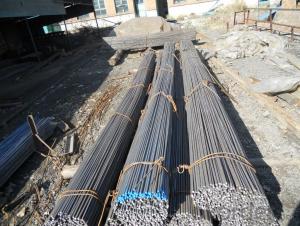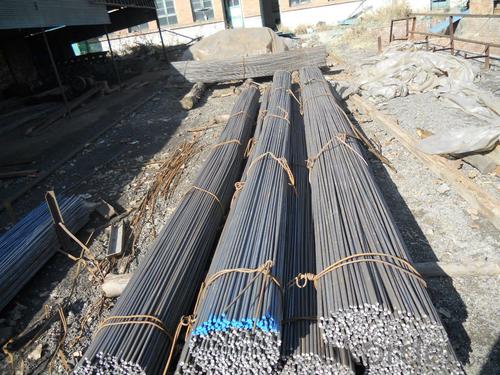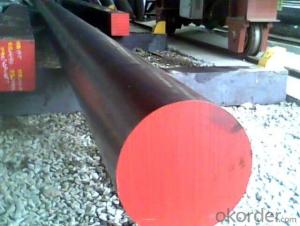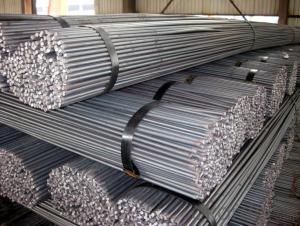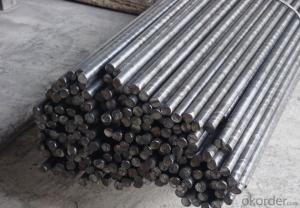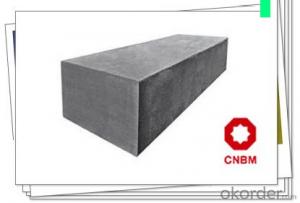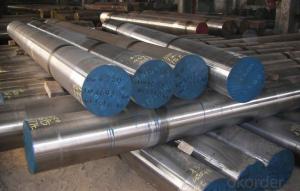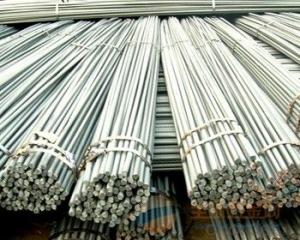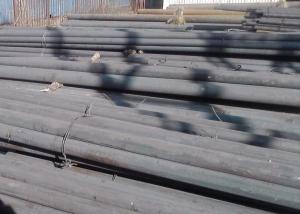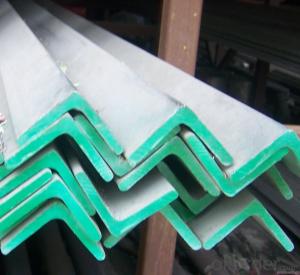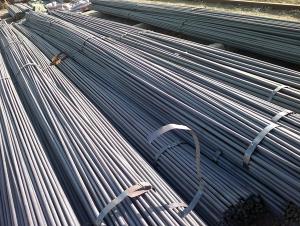round bars; round steel; high quality
- Loading Port:
- Tianjin
- Payment Terms:
- TT OR LC
- Min Order Qty:
- 1000 m.t.
- Supply Capability:
- 5000 m.t./month
OKorder Service Pledge
OKorder Financial Service
You Might Also Like
Product Description:
Specifications of Common Steel Round Bar
1. Grade: 304, 316L, 321
2. Type: Mild carbon steel
3. Shape: Round bar, solid bar of steel with circular section
4. Diameter: 8mm-150mm
5. HS Code: 72283010
Usage and Applications of Common Steel Round Bar
1. Common Steel Round Bar of 8-25mm, or small round is mostly used for straight bundles supply, and used for steel, bolts and various mechanical parts. While the bigger round bar, or more than 25mm hot rolled bar, is mainly for the manufacture of mechanical parts or for seamless steel billet.
2. Steel round bar is used in construction and a large number of architectural and engineering structures.
3. Besides, we can supply some especial material steel round bar that can be used for main shaft of steamer, hummer shank, with big section and supper force.
Packaging & Delivery of Common Steel Round Bar
Packaging Detail: All goods are packed in bundle with steel strips and shipped by break bulk vessel or container (depend on target market and different ports)
Delivery Detail: 45 days
Trade terms: FOB, CFR, CIF
MOQ: 25 tons per specification; we can negotiate the quantity if the specification is normal or we have stock of one specification.
Weight: The price invoicing on theoretical weight basis or actual weight basis depends on customer’s request.
Shipment: The shipment of bulk break or container is depends on customer’s request and the situation of the port of destination.
Documents given: Full set of original clean on board bill of lading; Original signed commercial invoice; Original packing list; Policy of insurance; Certificate of origin and what the target market needs.
Production Flow of Common Steel Round Bar
We use advanced equipments like Electric Arc Furnace, Ladle Furnace and Vacuum Degasser to produce our products.
Material prepare (billet) — heat up — rough rolling — precision rolling — cooling — packing — storage and transportation
- Q: What are the advantages of using nickel-chromium-cobalt alloy steel round bars?
- One advantage of using nickel-chromium-cobalt alloy steel round bars is their high strength and durability. This alloy steel has excellent resistance to corrosion, oxidation, and high temperatures, making it suitable for various applications in industries such as aerospace, automotive, and oil and gas. Additionally, the alloy's ability to maintain its mechanical properties at elevated temperatures makes it ideal for use in high-temperature environments. Its unique combination of properties allows for enhanced performance and extended lifespan of the round bars, making them a preferred choice for demanding applications.
- Q: Can steel round bars be bent?
- Yes, steel round bars can be bent. The flexibility of steel allows it to be shaped and manipulated into various forms, including bending round bars into desired angles or curves.
- Q: Can steel round bars be used in the agricultural industry?
- Yes, steel round bars can be used in the agricultural industry. They are often used for constructing support structures such as fences, gates, and livestock pens. Steel round bars are also used in machinery and equipment manufacturing for applications like tractor attachments, irrigation systems, and grain storage bins. Their strength, durability, and versatility make them suitable for various agricultural purposes.
- Q: Can steel round bars be used in the production of forgings?
- In the production of forgings, steel round bars can be utilized. These round bars are commonly employed as the primary materials in forging procedures. To shape them, the round bars are heated to a specific temperature and then subjected to diverse forging techniques like hammering, pressing, or rolling. Through the application of heat and pressure during the forging process, the mechanical properties of the steel are improved, rendering it stronger and more enduring. Steel round bars are highly suitable for forging production as they ensure a consistent and uniform shape, guaranteeing that the final product adheres to the required specifications. Furthermore, steel round bars offer versatility in terms of their size, grade, and composition, allowing for a wide range of applications across various industries such as automotive, aerospace, and construction.
- Q: What are the considerations for selecting the right steel grade for a round bar?
- When selecting the right steel grade for a round bar, there are several considerations to be taken into account. Firstly, it is important to consider the intended application of the round bar. Different steel grades have varying properties that make them suitable for specific purposes. For example, if the round bar will be used in a high-temperature environment, a steel grade with excellent heat resistance such as stainless steel or high-alloy steel would be ideal. On the other hand, if the round bar will be used in structural applications, a steel grade with good strength and ductility, such as carbon steel, may be more appropriate. Another consideration is the desired mechanical properties of the round bar. This includes factors such as the required tensile strength, yield strength, hardness, and toughness. These properties can vary significantly between different steel grades, so it is important to choose a grade that meets the specific requirements of the application. The corrosion resistance of the steel grade is also an important consideration. If the round bar will be exposed to corrosive environments, such as in marine or chemical applications, a stainless steel grade with high resistance to corrosion would be recommended. Alternatively, if corrosion resistance is not a major concern, a carbon steel grade may be more cost-effective. Cost is another factor that should be taken into consideration when selecting a steel grade for a round bar. Different steel grades have varying costs based on factors such as availability, demand, and manufacturing processes. It is important to balance the desired properties of the round bar with the available budget to ensure cost-effectiveness. Furthermore, it is important to consider the manufacturability of the steel grade. Some steel grades may be more difficult to machine or weld, which can impact the production process and cost. It is important to choose a steel grade that is readily available and can be easily processed to meet the required specifications. Lastly, it is always advisable to consult with steel suppliers, engineers, or metallurgists to ensure that the chosen steel grade aligns with the specific requirements of the application. They can provide valuable insights and recommendations based on their expertise and experience in the industry.
- Q: Can steel round bars be used in high-temperature applications?
- High-temperature applications can indeed utilize steel round bars. Steel possesses remarkable strength and durability, enabling it to endure high temperatures without any distortion or compromise to its structural integrity. Nevertheless, the suitability of steel for high-temperature applications is contingent upon the specific type of steel and its composition. For instance, stainless steel exhibits exceptional resistance to heat and can be employed in a broad spectrum of high-temperature settings. Furthermore, certain alloy steels are purposefully crafted for use in high-temperature applications, commonly encountered in industries like aerospace or petrochemicals. It is crucial to consult experts and carefully consider the specific requirements of the application in order to select the most appropriate steel round bars for high-temperature conditions.
- Q: Can steel round bars be used in the agriculture industry?
- Yes, steel round bars can be used in the agriculture industry. They are commonly used for applications such as building fences, constructing equipment, and supporting structures for agricultural buildings. Steel round bars offer durability, strength, and versatility, making them suitable for various agricultural applications.
- Q: Can steel round bars be used for making security grilles?
- Yes, steel round bars can be used for making security grilles. The strength and durability of steel make it an excellent choice for security applications, providing protection and ensuring the safety of premises.
- Q: Can steel round bars be used for fastener applications?
- Indeed, fastener applications can make use of steel round bars. In various industries, these round bars are frequently employed as fasteners due to their remarkable durability and high strength. By threading, drilling, or machining them, a variety of fasteners, including bolts, screws, and studs, can be fashioned. The outstanding tensile strength and corrosion resistance of steel round bars render them suitable for demanding tasks that necessitate robust and dependable fastening. Moreover, these round bars are easily obtainable in assorted sizes and grades, enabling customization based on precise fastener needs.
- Q: Can steel round bars be used in the production of valves?
- Yes, steel round bars can be used in the production of valves. Steel round bars are often used to create the main body or stem of a valve. The round shape of the bar allows for easy machining and shaping into the desired valve component. Steel is a strong and durable material, making it an ideal choice for valves, which need to withstand high pressures and temperatures. Additionally, steel can be easily welded, allowing for the attachment of other valve components such as flanges or fittings. Overall, steel round bars provide the necessary strength and flexibility required for the production of valves.
Send your message to us
round bars; round steel; high quality
- Loading Port:
- Tianjin
- Payment Terms:
- TT OR LC
- Min Order Qty:
- 1000 m.t.
- Supply Capability:
- 5000 m.t./month
OKorder Service Pledge
OKorder Financial Service
Similar products
Hot products
Hot Searches
Related keywords
